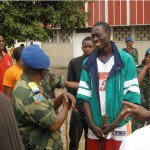Opposing groups search for common ground during ‘days of reflection’
By Charles Holmquist
As mentioned in a previous blog, community networks created to help communities have in some cases inadvertently caused animosity. Tasked with various health and education roles community networks may sometimes cause resentment amongst local communities who feel they are being lectured or reprimanded for their behavior. These committees are tasked for instance with sensitizing people on child abuse, or providing information on proper water, sanitation, and hygiene practices.
In order to tackle the tensions between the members of the community networks and the community itself, SFCG has employed a wide range of activities from our toolbox; among them participatory theater performances, radio messages, and “days of reflection”. During these days of reflection, members of the community networks, explain their roles to their community they serve, consisting of neighbors, local leaders and friends.
They also listen intently as their peers voice grievances, and are later given the opportunity to express their own complaints.
SFCG mediators are present to ensure that this articulation of grievances is done respectfully, and that the activity does not degenerate into a shouting match. “We establish codes of conduct and ask the participants to respect their counterparts’ opinions. We make it very clear that the day of reflection is not a trial, it is a search for common ground” Says Bienfait Muhigirwa, SFCG Program Assistant and moderator of the day of reflection. In a recent day of reflection in Lwana, complaints that the 41 community members expressed, were for instance that members of the networks had become arrogant, did not cooperate with various local leaders, or were unfair in whom they targeted to give aid. The 40 members of the networks on the other hand lamented that the local leaders were sometimes uncooperative or unscrupulous, and that the community was unfairly hostile towards them.
Equipped with knowledge of their counterpart’s perspectives, the 41 members of the community and the 40 members of the network went about to find solutions to these troubles. In general, they came to the consensus that the community should work together more closely. It seemed that the difficulties lay not in addressing a complex problem, but rather in bringing the disputing parties together and providing them with the space to respectfully listen to one another. The participants agreed that there should be closer collaboration between the networks and their communities. From now on, the networks will share their monthly reports and attend regular meetings with local leaders.
This agreement was consolidated with the signing of a protocol, followed by a cultural festival that was attended by 180 men and 195 women. This event, featuring traditional and modern song and dance, was not only a celebration of the renewed spirit of cooperation within the community, but also served as an opportunity to share the results of the day of reflection with a wide audience. “Our role is to help the community to live together peacefully, for there can be no development without peace” said Mr. Muhigirwa.
#####
Charles Holmquist holds a Bachelor’s degree in Politics and Philosophy and a Master’s degree in International Relations from the University of Manchester in England. He has interned with SFCG in Washington and is currently interning in our Bukavu (DRC) office. He has worked on evaluations of SFCG’s sensitization work with the Congolese military, and in assessing the security situation in the eastern DRC for the UNICEF funded PEAR + (Programme of Expanded Assistance to Returnees) project.









